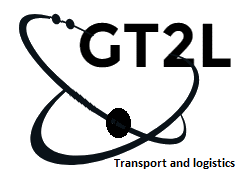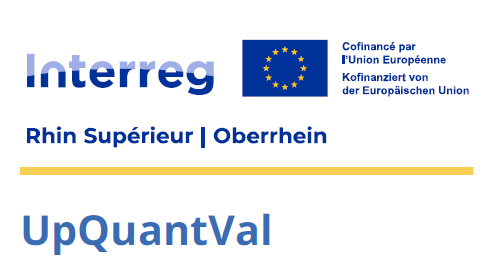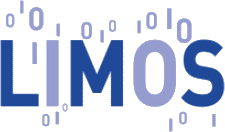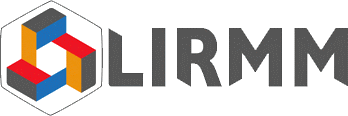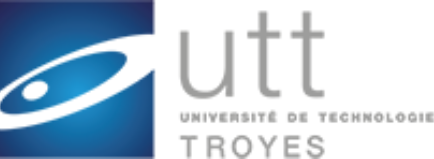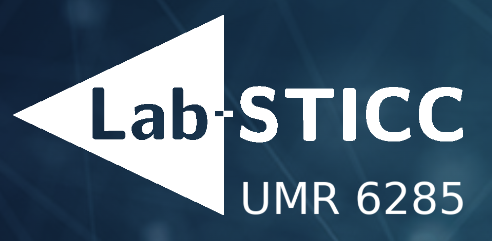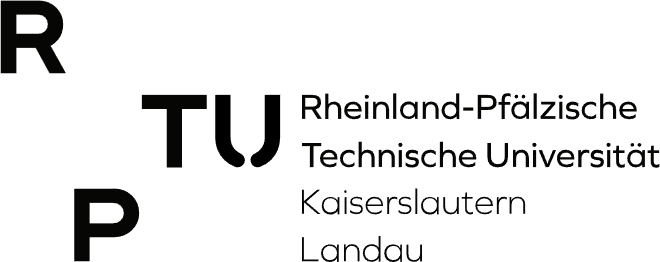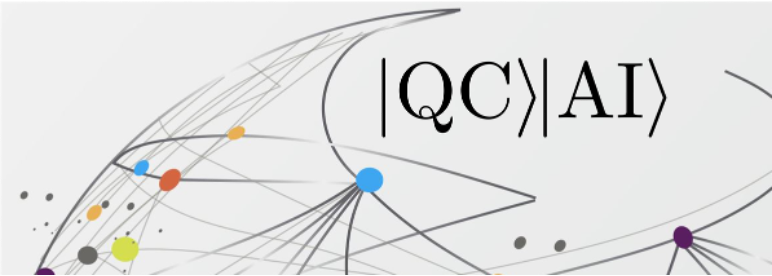-
-
Join us for an exciting exploration into the world of optimization! This event promises to unveil groundbreaking strategies that leverage quantum and metaheuristic technologies to tackle complex challenges innovatively. The 22nd edition of the EU/Meeting will be held in Germany. It will focus on recent advances in metaheuristics, including those influenced by quantum computing. This international joint event is coordinated under the supervision of EUME/GT2L for the conference and EUME/GT ROQ for the school. The organizers will issue certificates of participation for the doctoral schools. As the number of spots is limited, we encourage you to register as soon as possible.
We look forward to seeing you in Kaiserslautern.
Previous event in Troyes
-
The coordination of the event is under the supervision of both EUME /GT2L for the conference and EUME/EWG Quantum OR/GT ROQ f for the school which organized together an international joint event composed of three items:
• Quantum conference sessions focusing on quantum application to optimization problem ; All interested researchers, especially PhD students, are invited to submit a research paper on their thesis work, or for first-year students, a paper on their thesis topic.
• EUME conference sessions focusing on the last advances on metaheuristic ;
For more than 2 decades, the annual European Congress on Metaheuristics (EU/Meeting) has been held in a European city. The objective is to bring together specialists in the field of optimization, and allow them to present their latest advances in terms of metaheuristic type resolution methods as well as to give tutorials on specific subjects.
• a school (including practices) on quantum optimization ;
The school has a specific focus on quantum "metaheuristics" including adiabatic optimization.
The school is dedicated to researchers and PhD students who are interested in discovering the quantum theory with application to very concrete problems including for example graph coloring, SAT and/or TSP.
Key-points:
• The school enclosed in introduction to configure programming environments, and make in short time the first quantum program. IBM will be in charge of the introduction the IBM Qiskit solution, Eviden is in charge of the introducion on the Qaptiva Solution and Wesley Coelho in charge of the introduction of the PASQAL solution. • Eviden session dedicated to introducing Quantum Programming and utilizing Qaptiva myQLM, a free Python package.; • The examples are linked to classical well-know operational problems.
The organizers of this event will issue a certificate of participation for the doctoral schools
The event is organized by: • Marc Sevaux (Executive committee member of EWG Quantum OR) • Caroline Prodhon (Executive committee member of EWG Quantum OR) • Eric Bourreau(Executive committee member of EWG Quantum OR) • Philippe Lacomme (Executive committee member of EWG Quantum OR) • Gerard Fleury (Executive committee member of Quantum OR) • Anita Schoebel (Executive committee member of EWG Quantum OR) • Alexey Bochkarev (RPTU Kaiserslautern-Landau) • Pascal Halffmann (Fraunhofer ITWM)
Local organization : • Alexey Bochkarev (RPTU Kaiserslautern-Landau) • Pascal Halffmann (Fraunhofer ITWM) • Anita Schoebel (Executive committee member of EWG Quantum OR)
-
-
EURO (The Association of European Operational Research Societies)
-
Labsticc
-
Quantum Computing Solutions to empower your business | Eviden
-
GDR RO (Groupement de Recherche en Recherche Operationnelle)
-
LIMOS
(Laboratoire d'Informatique de Clermont-Ferrand)
-
EU/ME
(EURO Working Group on Metaheuristics)
-
EWG Quantum OR
(https://quantum-or.euro-online.org/about/)
-
UTT
(Université de Technologie de Troyes)
-
LIRMM
(Laboratoire d'Informatique de Montpellier)
-
LIST3N
(Computer Science and Digital Society - UTT)
-
EURO (The Association of European Operational Research Societies)
-
-
•Alexey Bochkarev, Pascal Halffmann and Anita Schoebel
Kaiserslautern
-
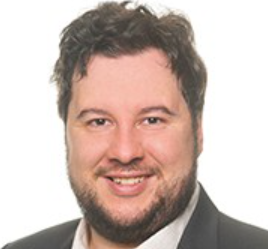
-
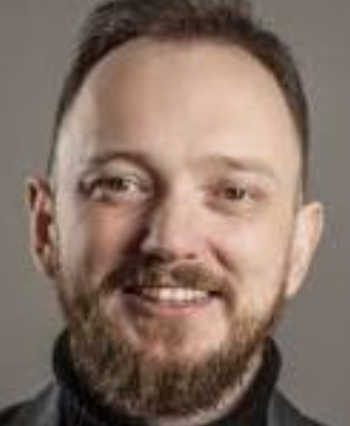
-

-
They in charge of the local organization and welcomes us to Kaiserslautern for this school where she takes care of the logistics of the event.
Thank you for the management of the rooms, the management of the registrations, ... and the resolution of the thousand of daily problems
-
•Alexey Bochkarev, Pascal Halffmann and Anita Schoebel
-
-
• Alexey Melnikov
Airbus
-
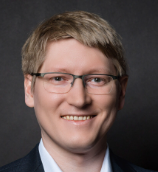
-
Alexey obtained his Ph.D. in Physics from the University of Innsbruck, Austria in 2018, focusing on the intersection of physics and machine learning. Post-Ph.D., he assumed postdoctoral roles at the University of Innsbruck and the University of Basel, Switzerland, exploring the integration of AI in physics. As a Visiting Assistant Professor, he served the National Tsing Hua University, Hsinchu, Taiwan. In 2019, Alexey and his co-authors were honored with the Cozzarelli Prize from the National Academy of Sciences, USA, in the Physical and Mathematical Sciences category. Since 2020, at Terra Quantum, Dr. Alexey Melnikov serves as Global Director of AI, leading the company’s applied quantum‑machine‑learning work on hybrid quantum neural‑network software for industry.
-
-
• Narendra Hegade
Kipu Quantum
-
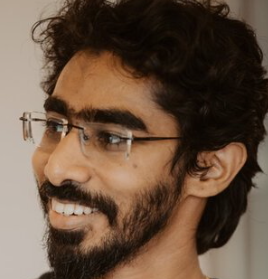
-
He is a physicist specializing in quantum optimization and quantum simulation.
He did his PhD in theoretical physics from Shanghai University, China, and later joined Kipu
Quantum in Berlin, where I played a key role in building the company’s core technology.
He has been working there for the past four years, leading the technology team as Head of Innovation
and currently serving as a Fellow of Technology.
His research focuses on digitized-counterdiabatic protocols for quantum optimization and
simulation, digital-analog quantum computing, and, more recently, quantum-enhanced combinatorial
reasoning for large language models.
-
• Prof. Dr. Anita Schöbel
past president of the EURO (Association of European Operational Research Societies)
-

-
Anita Schoebel is professor for Applied Mathematics at the Technical University of Kaiserslautern and director of the Fraunhofer Institute for Industrial Mathematics ITWM with more than 450 employees. At Fraunhofer Society, she is responsible for the strategic research area Next Generation Computing and vice spokesperson for the quantum computing competence network. In 2019 and 2020 she has been president of the German Operations Research Society (GOR). Currently she is president-elect of EURO (Association of European Operational Research Societies) and will be president of EURO in 2023 and 2024.
A short bio in English : here
-
• Dean Smith
Eviden
-
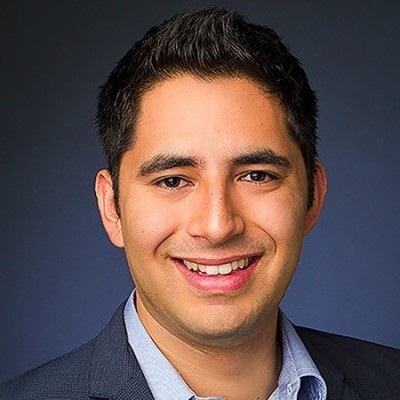
-
Dean works as a technical expert in quantum computing at Eviden Science & Computing AG, active in the field since 2019. Dean Smith's interests lie in science, engineering, and deep tech. Dean's R&D activities include quantum simulations, QML, discrete optimization, and codesign. As a biophysicist, Dean has interdisciplinary knowledge ranging from mathematics and computer science to biology. Dean also tutors university students and volunteers as a Python teacher for refugees, fostering an open-minded and communicative work environment
.
-
• Pierre Jaeger
IBM
-
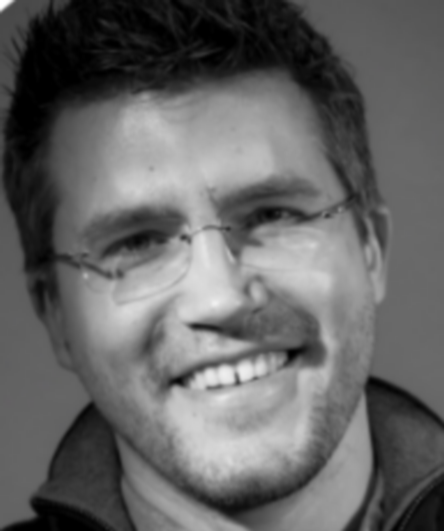
-
Pierre is an IBM Technical Director, in charge of establishing strong and sustainable partnerships related to quantum technologies. He has over 18 years of extensive experience in Architecture and Technology Consulting with a focus on Systems, Digital transformation, Cognitive Computing, Big Data, and Analytics.
- Description :
-
He will introduce us the IBM solution including a presentation of Qiskit solution.
-
• Jean-Michel Torres
IBM
-

-
Jean-Michel is of of the Qiskit advocate of the IBM staff from 1989. He regularly participates in training actions with students and companies to promote quantum computing.
- Description :
-
He will introduce us the IBM solution including a presentation of Qiskit solution.
-
• Frank Phillipson
Maastricht University
-
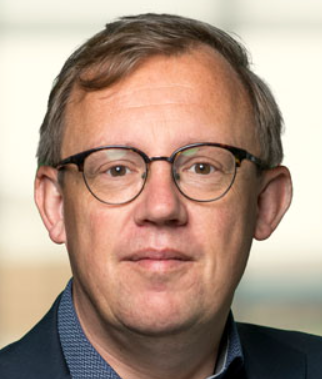
-
Frank is senior scientist and professor at Maastricht University in Computational Operations Research, specialized in optimization in telecommunication, energy and logistics networks. Most of his current work is focused on finding new computational techniques for optimization and other hardware accelerators.
- Description :
-
Quantum computing offers transformative potential for optimization problems, which are central to industries like logistics, finance, and manufacturing. Traditional algorithms struggle with large-scale, complex problems, while quantum algorithms promise to solve them exponentially faster. However, challenges remain in harnessing quantum power, including hardware limitations and the need for specialized expertise. This presentation will explore the key opportunities and hurdles in applying quantum computing to optimization, examining its potential to revolutionize decision-making processes and reshape global industries.
-
• Wesley COELHO
PASQAL
-
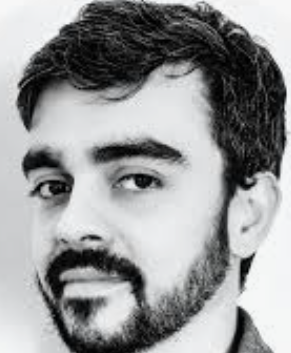
-
Wesley Coelho holds a Master’s degree in Models and Algorithms for Decision Support and a Ph.D. degree in Computer Science with an emphasis on Operations Research (Applied Mathematics). He currently works as a Quantum Applications Engineer at
PASQAL
, where he develops innovative algorithms to extend the field of applications of PASQAL’s Quantum Computers. His interests are mainly on Quantum Optimization and related applications.
- Description :
-
During the school, he will talk about Analog Quantum Computing while presenting PASQAL technology. He will also propose workshops where participants will be able to use PASQAL solutions to solve optimization problems.
-
• Narendra Hegade
-
• Alexey Melnikov
-
Registration due date "2025 July 15th"
Participation is subjected to the payment of a participation fees of € 200
The (mandatory) registration fee covers expenses for lunches, coffee breaks, and one social event.
How to participate?
Participation is open for everyone interested in quantum computing and OR. Membership in the EURO working group is not mandatory. Submission of a paper is encouraged, but also not required.
• You can be at the school for classes and practical works • Submission of one paper is encouraged but it is not required • You can be at the conference just to listen the presentations
In all cases, make your registration early
How to registrer?
• STEP 1
Complete the online form
Warning : the number of places being limited, we advise you to register as soon as possible
• STEP 2 . Please download the registration form and return the form to emergingoptimization@gmail.com :
Version word Version pdf • STEP 3 .Payment of the registration fees must be achieved by bank transfer
Remark : After your registration you will received by email all the information to achieved the payment.
Certificates of attendance will be issued and may be used by PhD studends to request validation of courses in doctoral schools.
Pour les membres des universités Françaises : pas de paiement par bon de commande
-
As extend abstract for the session on quantum advances in pdf format of 6 pages must be sumitted to publication by email pascal.halffmann@itwm.fraunhofer.de with a subject entitled "Paper submission".
As extend abstract for the PhD session in pdf format of 4 pages must be sumitted to publication by email dimitrios.papadimitriou@ulb.be with a subject entitled "Paper submission".
Please use the following word template or the latex package provided by Alexey latex template
Due date for submission : June 15th, 2025 .
The paper submitted will online if and only if the authors are agree and if not only one abstract will be provided on the site.
If you are interested to organize a session contact us by email emergingoptimization@gmail.com with a subject entitled "session submission"
-
-
• Wenesday 10 September : Opening event and sessions (QLM, Qiskit)
- 8h30-9h00 :
- Registration (main entrance) and coffee break at Lecture Hall
- 9h00-9h15 :
- Introductory speech of Anita Schoebel (head of Fraunhofer ITWM) - Lecture Hall
- 9h15-9h30 :
- Introductory speech by Marc Sevaux on behalf of the organizers - Lecture Hall
- 9h30-10h15 :
- Plenary session of Alexey Melnikov - Lecture Hall
- :
- This talk surveys quantum machine learning from first principles to practice, with a focus on quantum neural networks (QNNs) and hybrid quantum‑classical architectures. I show how data‑encoding choices govern QNN expressivity via truncated Fourier series and motivate parallel quantum layers that are practical in the NISQ era. Case studies in time series forecasting, image classification, and physics‑informed simulation demonstrate competitive accuracy with fewer parameters. I close by outlining an end‑to‑end engineering pipeline that operationalizes and optimizes hybrid QML models from data to deployment.
- 10h15-10h30 :
- Coffee break - reception area (foyer) between lecture hall and seminar room
- 10h30-10h45 :
- Pierre Jaeger (IBM) : Qiskit solution for quantum - Lecture Hall
- :
- IBM's strategy regarding quantum challenges
- 10h45-11h45 :
- Introduction to Quantum Gate with (Speaker from IBM) - Pierre Jaeger et JM. Torres - Lecture Hall
- :
-
Short introduction with example and the basis of theory
- - Lunch at the ITWM Canteen -
- 13h30-15h00 :
- Practical work on Qiskit with Eric Bourreau and Jean-Michel Torres from IBM - Session Hall
- :
-
First implementation and first quantum circuit
- 15h00-15h30 :
- Coffee break - reception area (foyer) between lecture hall and seminar room
- 15h30-17h30 :
- Practical work on Qaptiva Quantum computing programming and emulation environment with Dean Smith from Eviden - - Lecture Hall
- :
-
First implementation and first quantum circuit
- 17h30-18h40 :
- Quantum session with chairman Papadimitriou Dimitrios Session Hall
- :
- The session is dedicated to the research on the interface of quantum computing and OR by PhD students.
- Marc Couty, Andre Devillars, Philippe Lacomme, Bogdan Vulpescu, Romain Perrier, Classical resolution of Molecular Quantum Chemistry
- Alessia Ciacco, Francesca Guerriero, Veronica Mosca, Quantum Optimization for Drone-Based Monitoring in Precision Agriculture
- Finley Alexander Quinton, Efficient variational quantum algorithms for optimization of energy systems under uncertainty.
-
• Thursday 11 September : sessions
- 8h00-8h45 :
- Plenary session of Frank Phillipson - Lecture Hall
- :
- As computational needs expand, new computing paradigms such as GPUs, FPGAs, high-performance computing clusters, digital annealers, neuromorphic computing systems, and quantum computers are emerging to complement traditional CPU-based computing models. Each paradigm offers unique capabilities for combinatorial optimization, a field concerned with finding the best solution from a finite set of possibilities. This talk addresses the challenge of fairly benchmarking the performance of combinatorial optimization solvers across these diverse paradigms. I propose a holistic approach to benchmarking that includes recommendations for fair comparisons and the introduction of new metrics. Findings highlight the need for clear and equitable comparison criteria, particularly when contrasting digital and analogue platforms or different algorithm classes.
- 8h45-9h30 :
- Plenary session of Narendra Hegade - Lecture Hall
- :
- In this talk, I will present our recent work on bias-field digitized counterdiabatic quantum optimization (BF-DCQO) algorithm, showing a runtime quantum advantage on current commercially available superconducting hardware with 156 qubits. We test BF-DCQO on carefully chosen higher-order unconstrained binary optimization (HUBO) instances that are difficult for classical methods, comparing time-to-approximate solutions against simulated annealing and CPLEX on multicore CPUs. Classical solvers require fractions of a minute, whereas the quantum runs return comparable or better solutions within a few seconds, demonstrating a runtime quantum advantage. Our analysis shows that this performance improvement becomes more pronounced as the system size increases. The talk will cover instance design, evaluation methodology, and scaling behavior, and conclude with a perspective on how ongoing hardware and algorithmic advances could extend these gains, potentially by orders of magnitude, and enable practical near-term applications even before fault-tolerant quantum computers.
- 9h30-10h00 :
- Coffee break - reception area (foyer) between lecture hall and seminar room
- 10h00-11h30 :
- Quantum session with chairman Papadimitriou Dimitrios Session Hall
- :
- The session is dedicated to the research on the interface of quantum computing and OR by PhD students.
- Rui Xu and Jean-Charles Creput, A Study of Quantum Distance-based ML Algorithm Applied for Euclidean TSP
- Ali Abbassi ,Yann Dujardin, Eric Gourdin, Philippe Lacomme, Caroline Prodhon, Introduction to Photonic Variational Quantum Circuit to solve a QUBO
- Martin Bombardelli, Gerard Fleury, Philippe Lacomme, Bogdan Vulpescu, Introduction to photonic quantum gates
- - Lunch at ITWM Canteen -
- 12h30-14h00 :
- Practical Work with Pasqal solution with Wesley Coelho and Yassine Naghmouchi - Session Hall
- :
- Quantum and hybrid solvers for solving optimisation problems with neutral-atom quantum computers..
- 14h00-14h15 :
- Eviden : Qaptiva platform solution for quantum challenges - Ingo Seipp
- :
- Eviden's strategy regarding quantum challenges
- 14h15-16h15:
- Advanced practical work : Grover Implementation with Eric Bourreau and Philippe Lacomme - Session Hall
- :
- The objective is to create a Grover implementation to find one value into an array
- 16h15-16h30 :
- Coffee break - reception area (foyer) between lecture hall and seminar room
- 16h30-16h45:
- A special quantum QUIZZ by Jean-Michel Torres - Lecture Hall
- 16h45-18h35:
- A special session of papers on quantum advances with chairman Pascal Halffmann - Session Hall
- - Eric Bourreau, Gérard Fleury, and Philippe Lacomme: Efficient TSP resolution combining warm-start and swap-based mixer
- - Jérôme Rouzé, Nouredine Melab, and Daniel Tuyttens: A Memetic Algorithm for Qubit Mapping on Noisy Intermediate-Scale Quantum Machines
- - Sebastian Rubbert and Oliver Szal: Benchmarking quadratic modelling variations of the Maritime Inventory Routing Problem on a hybrid quantum annealing system
- - Anastazija Pazin: Presentation on post quantum cryptography
-
• Friday 12th September
- 8h00-9h40:
- A special session of papers on quantum advances with chairman Pascal Halffmann - Session Hall
- - Alexey Bochkarev, Raoul Heese, Sven Jäger, Philine Schiewe, and Anita Schöbel: Quantum computing for discrete optimization: a highlight of three technologies
- - Torbjørn Smedshaug, Finley Alexander Quinton, and Mostafa Barani: Performance and robustness of multi-angle QAOA with biased initial states on constrained optimisation with applications to minimum vertex cover
- - Friedrich Wagner, Christian Ufrecht, Martin Braun, and Daniel D. Schere: Optimized Circuit Cutting for QAOA Sampling Tasks
- - Ivica Turkalj, Tom Ewen, Pascal Halffmann, Janik Maciejewski, Michael Trebing, Zakaria Abdelmoiz Dahi: Variational Quantum Algorithms for Multiobjective Optimization
- 9h40-10h00:
- Coffee break - reception area (foyer) between lecture hall and seminar room
- 10h00-10h15:
- A special quantum QUIZZ by Jean-Michel Torres - Lecture Hall
- 10h15-12h00 :
- Visit to the quantum computer at the university. The visit organized by Alexey Bochkarev will provide a rare opportunity to see a real quantum machine. -
- - Lunch at ITWM Canteen -
- 12h30-14h00 :
- Visit to the quantum computer at the university. The visit organized by Alexey Bochkarev will provide a rare opportunity to see a real quantum machine. -
- 14h30-17h00 :
- Advanced Practical work : Graph Coloring Resolution with Adiabatic Optimization with Eric Bourreau and Philippe Lacomme - Session Hall
-
• For questions or issues : ( emergingoptimization@gmail.com) ) • For questions or issues concerning the registration : ( emergingoptimization@gmail.com) )
-
The event takes place at the Fraunhofer ITWM .


-
- Caroline Prodhon
- UTT
- Validated
- Philippe Lacomme
- LIMOS
- Validated
- Anita Schoebel
- IEMN - JUNIA
- validated
- Alexey Bochkarev
- RPTU Kaiserslautern
- Validated
- Pascal Halffmann
- Fraunhofer-Institut
- Validated
- Marc Sevaux
- Labsticc
- Validated
- Eric Bourreau
- LIRMM
- Validated
- Bombardelli
- LIMOS
- Validated
- Ali Abassi
- UTT
- Validated
- El Morsalani
- QWave Consult
- Validated
- Serigne Gueye
- Laboratoire Informatique d'Avignon
- Validated
- Mahdi Moeini
- Ecole Nationale Superieure d'Informatique pour l'Industrie et l'Entreprise (ensIIE)
- Validated
- Chenyu Shi
- Leiden University, Leiden Institute of Advanced Computer Science
- Validated
- Essognim Richard WILOUWOU
- Lab-STICC
- waiting confirmation
- Romain PERRIER
- ISIMA and Michelin
- Validated
- Jerome Rouze
- UMONS
- Validated
- ALEKSEEVA
- EURODECISION
- Validated
- Rola Saidi
- EDF R&D
- Validated
- Rui XU
- UTBM
- Validated
- Gabriele Sanguin
- University of Padova
- Validated
- Alessia Ciacco
- University of Calabria
- Validated
- Rodrigo Linfati
- Universidad del Bio-Bio
- Validated
- David Ribes
- NTNU
- Validated
- Vincenzo Gallo
- University of Salerno
- Validated
- Valter Laino
- University of Salerno
- Validate
- Raffaella Rinaldi
- Universita degli Studi di Salerno
- Validated
- Giuseppe Di Leo
- University of Salerno
- Validated
- Marco Carratu
- University of Salerno
- Validated
- Auriane CADORIN
- Multiverse Computing
- Validated
- Finley Quinton
- Norwegian University of Science and Technology
- Validated
- Tatiana Grandon
- NTNU
- Validated
- Angus Dunnett
- Multiverse Computing
- Validated
- Stefan Klug
- Universitat der Bundeswehr Munchen
- Validated
- Yoseph Hutten
- Maastricht University, TNO
- Validated
- Lorenzo Gaggini
- LIRMM
- Validated
- Filippo Bonafe
- UNIMORE
- waiting confirmation
- Yagnik Chatterjee
- Total Energie
- validated
- Dimitri Papadimitriou
- ULB
- waiting confirmation
- Oliver Szal Researcher
- Fraunhofer CML
- validated
- Benjamin Romer
- Stadtwerke Langen
- validated
- Sunil Karki Researcher
- Central Department of physics(Tribhuvan University)
- under process
- Edwin Isidory
- Institute of Aircraft Systems - University of Stuttgart
- under process
- Mohamed HIBTI
- EDF R&D
- waiting confirmation
- Prof. Dr. Lin Xie
- Brandenburgische Technische Universitat Cottbus-Senftenberg
- under process
- Butikofer Stephan
- University of Applied Sciences Zurich (ZHAW)
- Validated
- Hayden Dyke
- Imperial College London
- Validated
- Raouia Taktak
- University of Sfax
- validated
- Peter Fusek
- Zurich University of Applied Sciences
- Validated
- Adhe Kania
- Institut Teknologi Bandung
- waiting confirmation
- Samuel Deleplanque
- JUNIA
- validated
- Felix Broesamle
- Chair of Discrete Optimization and Logistics (Karlsruhe Institute of Technology)
- validated
- Amine Oussama
- Clermont-Ferrand
- validated
- Johanna Sepulveda
- Airbus
- guest
- Frank Phillipson
- Maastricht University
- guest
- Ingo Seipp
- IBM
- guest
- JM Torres
- IBM
- guest
- O. Hess
- Eviden
- guest
- Dean Smith
- Eviden
- guest
- Wesley Coelho
- Pascal
- guest (disc. in progress)
- Sibel Salman
- Koc University
- Waiting confirmation
- Torbjørn Smedshaug
- Norvegian Institute
- validated
- Friedrich Wagner
- Fraunhofer IIS
- validated
- Narendra Hegade
- Head of Innovation at Kipu Quantum
- validated
- Yassine NAGHMOUCHI
- Pasqal
- guest (disc. in progress)
-
B&B Hotel Hotel Barth SAKS Urban Design Hotel Art-Hotel Lauterbach Best Western Hotel Alcatraz am Japanischen Garten Zollamt Design-Hotel Stadthotel Herr Jacobs Bistro und Hotel Hampton by Hilton Kaiserslautern
Regarding reaching the institute by car & public transport, a link here: https://www.itwm.fraunhofer.de/en/contact.html#1 For the participants, the main concern is probably how to get from the train station or city center to the institute: there you can use the bus lines 106 and 115 and get off at the bus stop Fraunhofer-Zentrum .
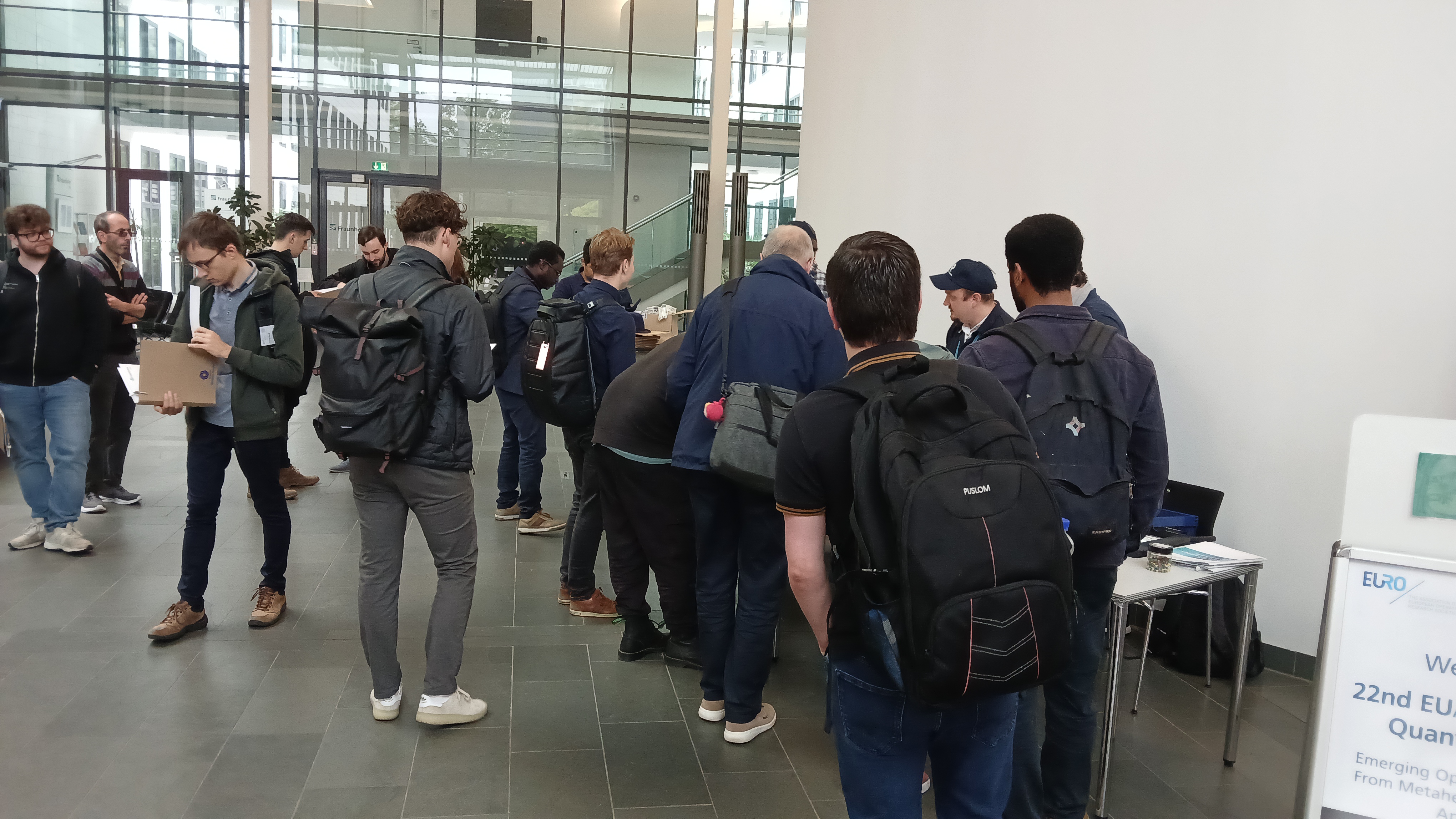
Registration 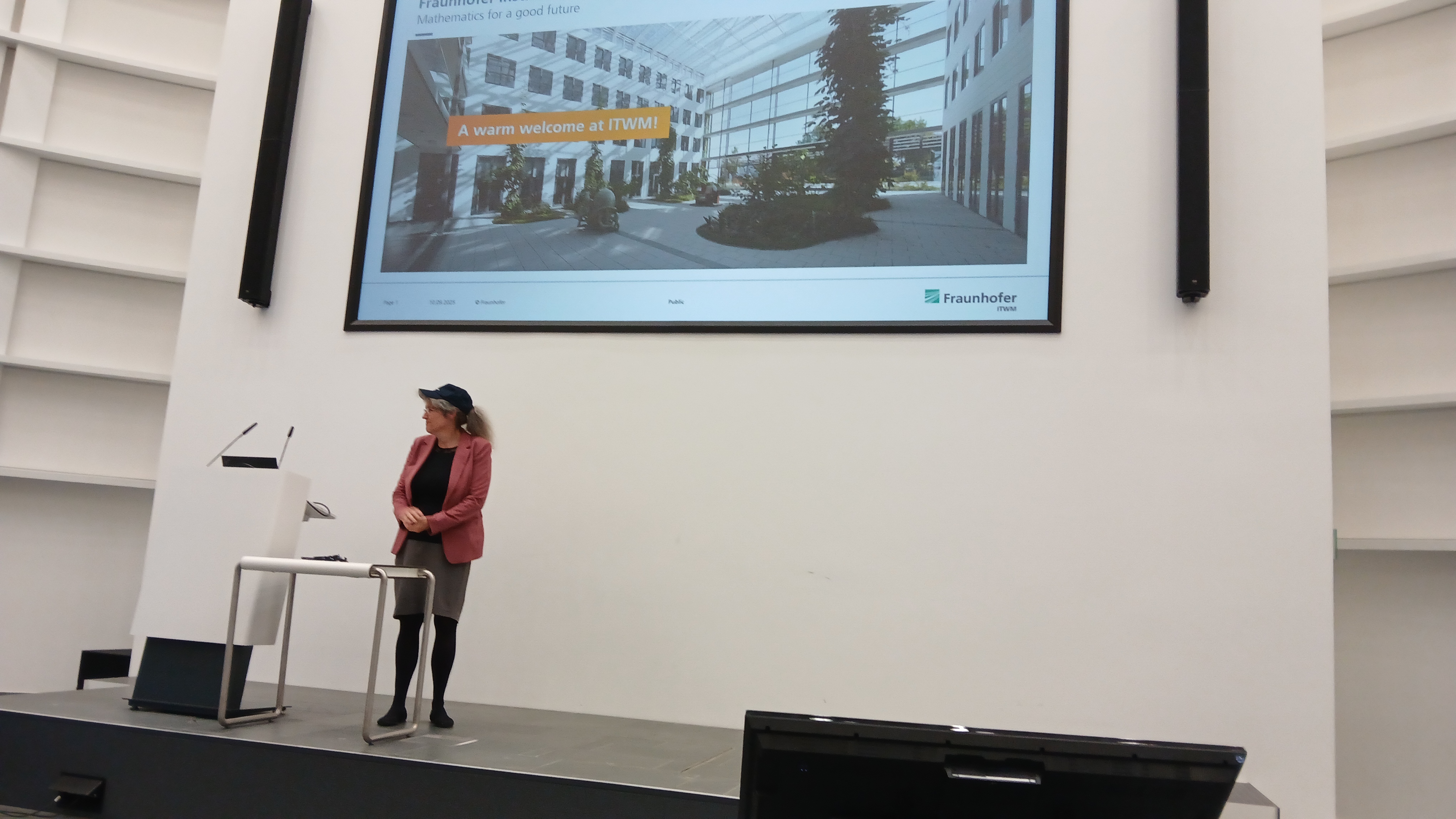
Anita speaking for introduction 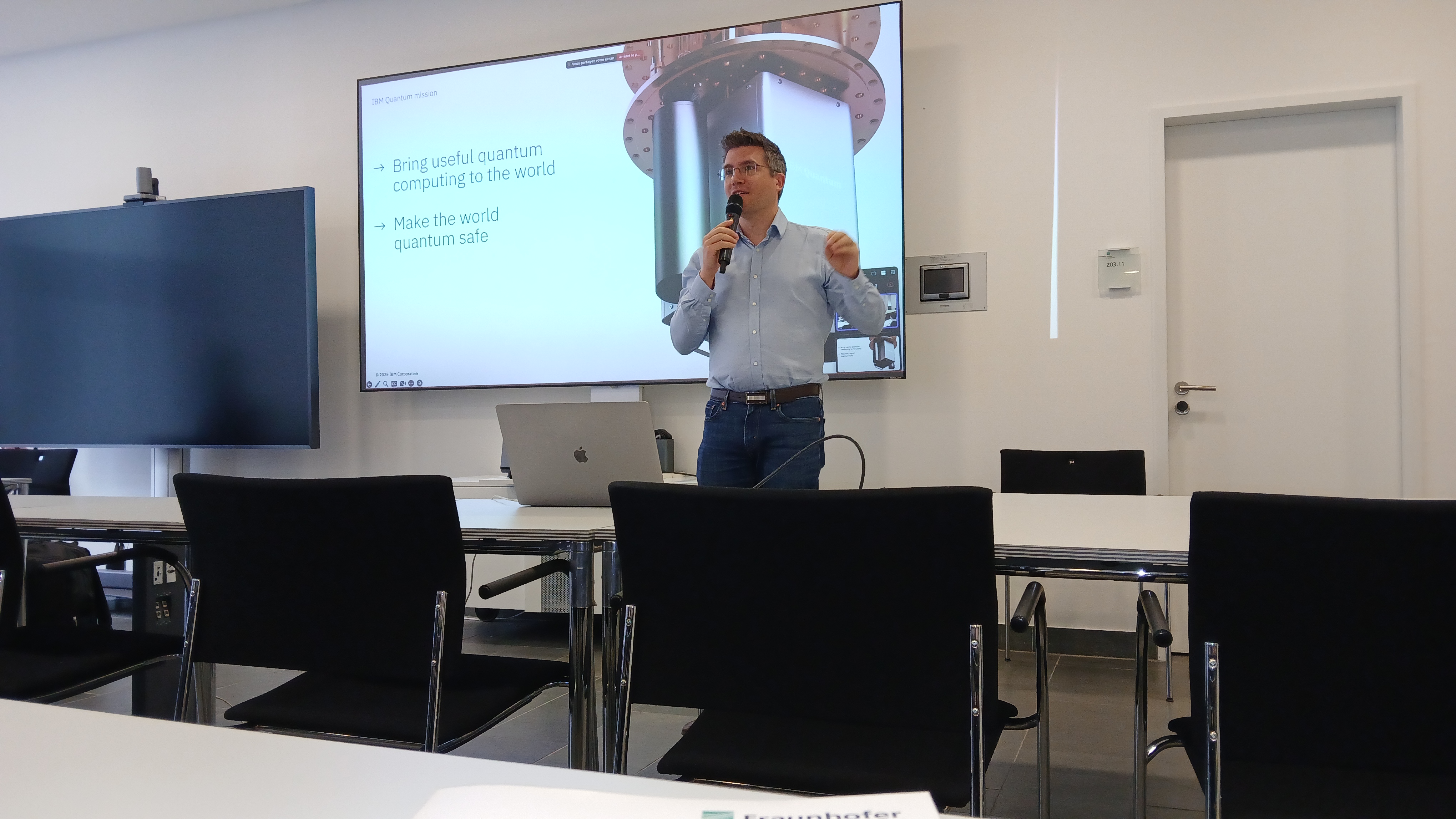
Pierre Jaeger 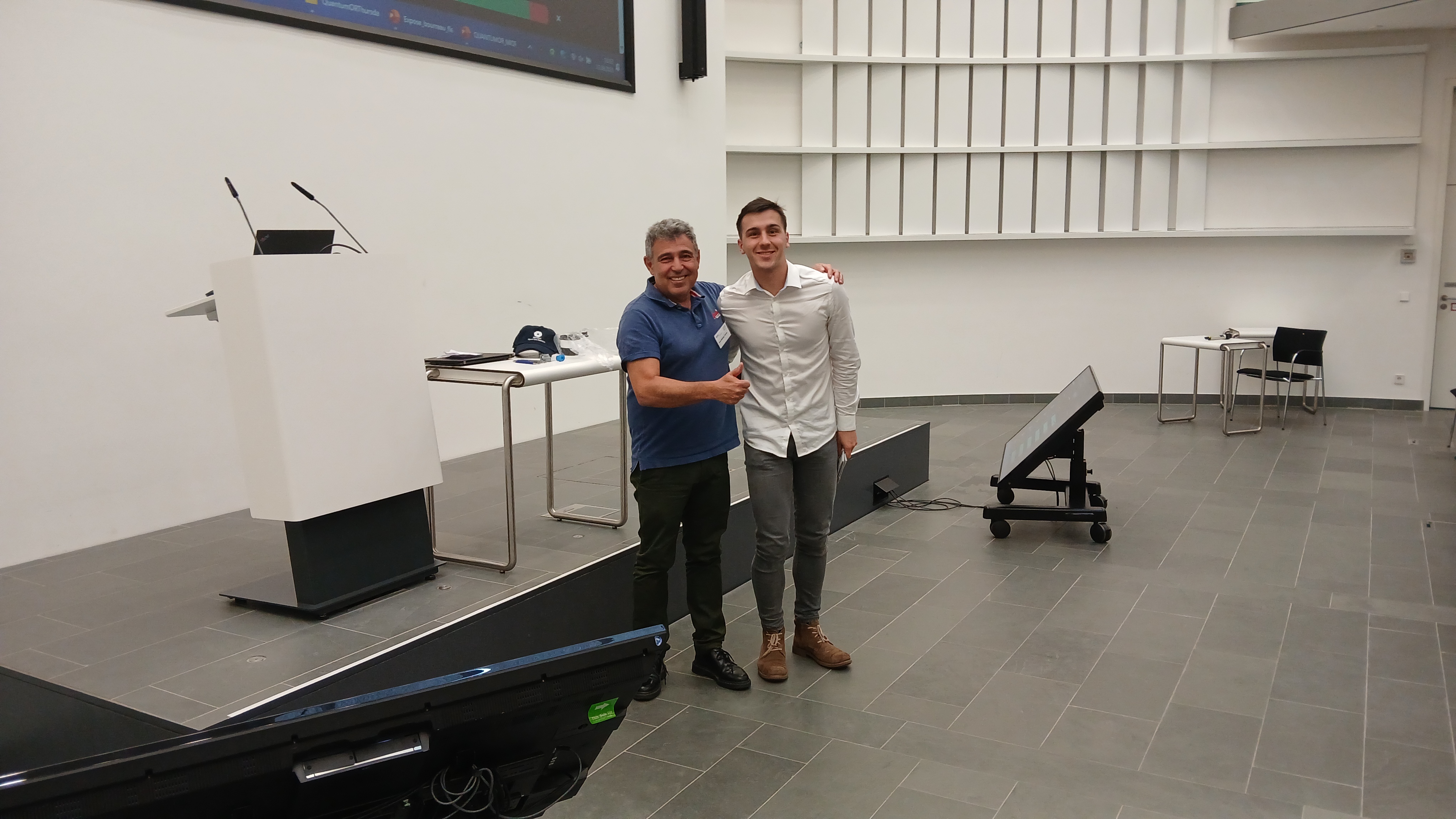
JM Torres and M. Bombardelli 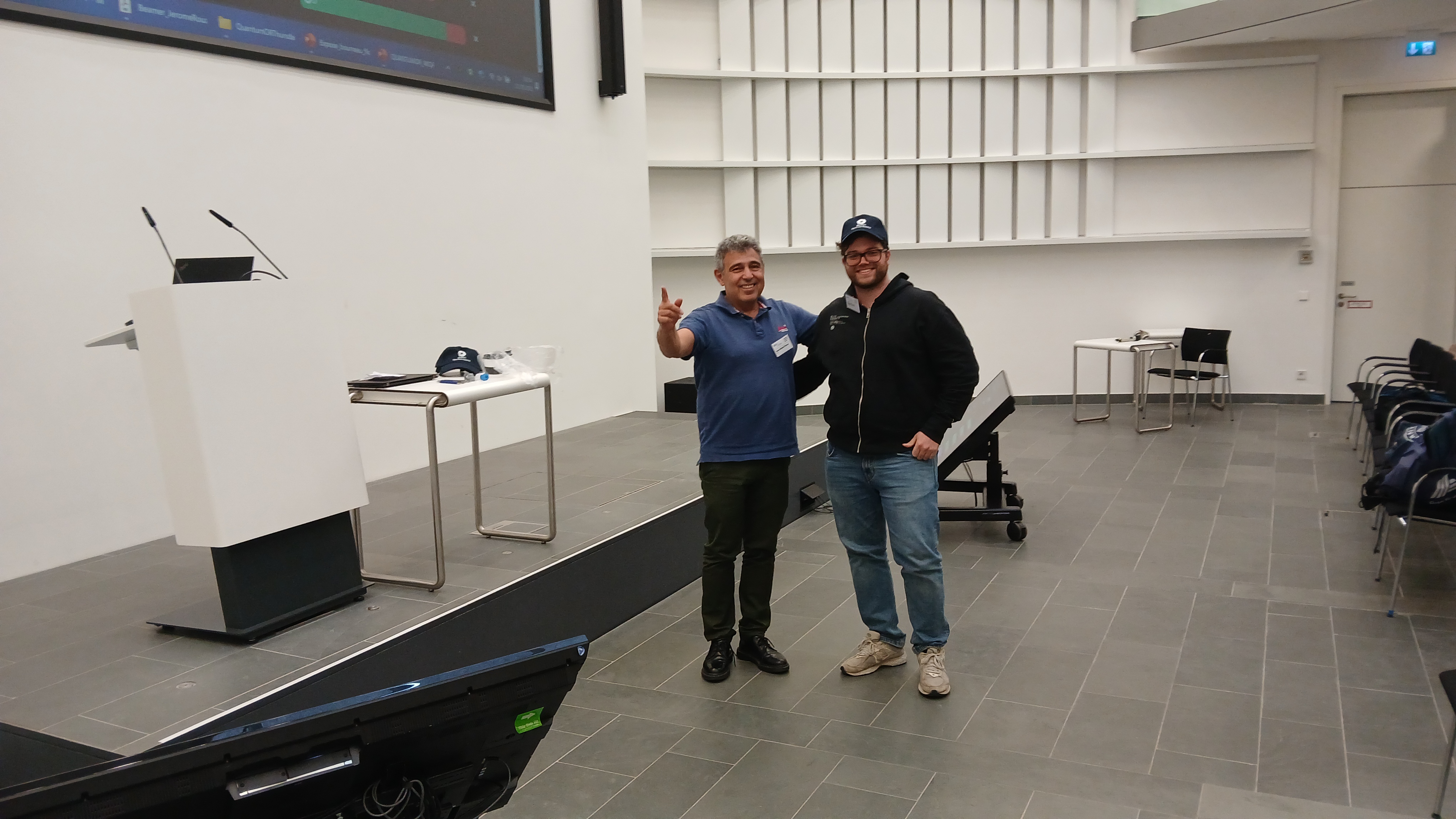
JM Torres with a Phd that wins a quantum cap 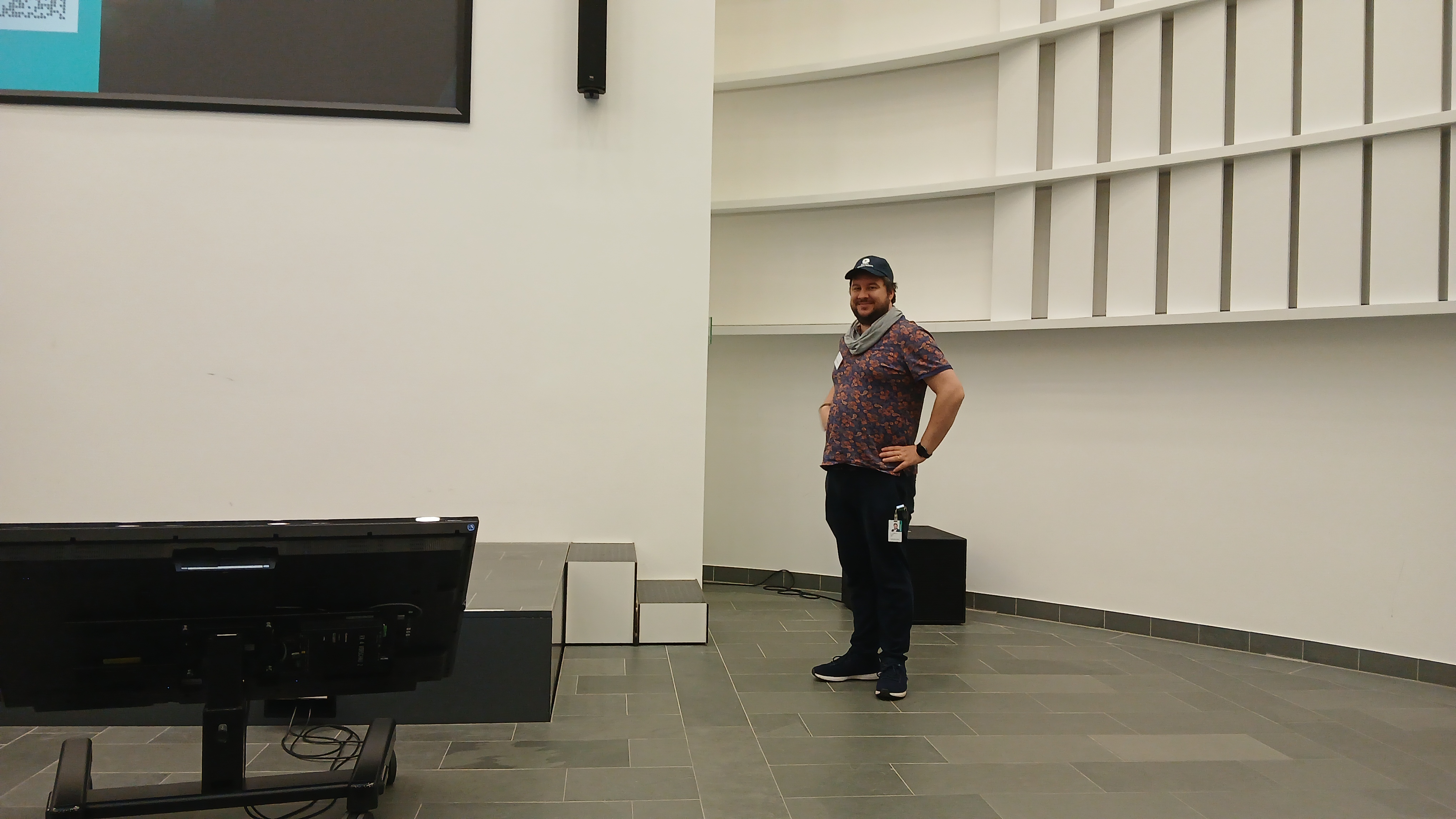
Pascal... 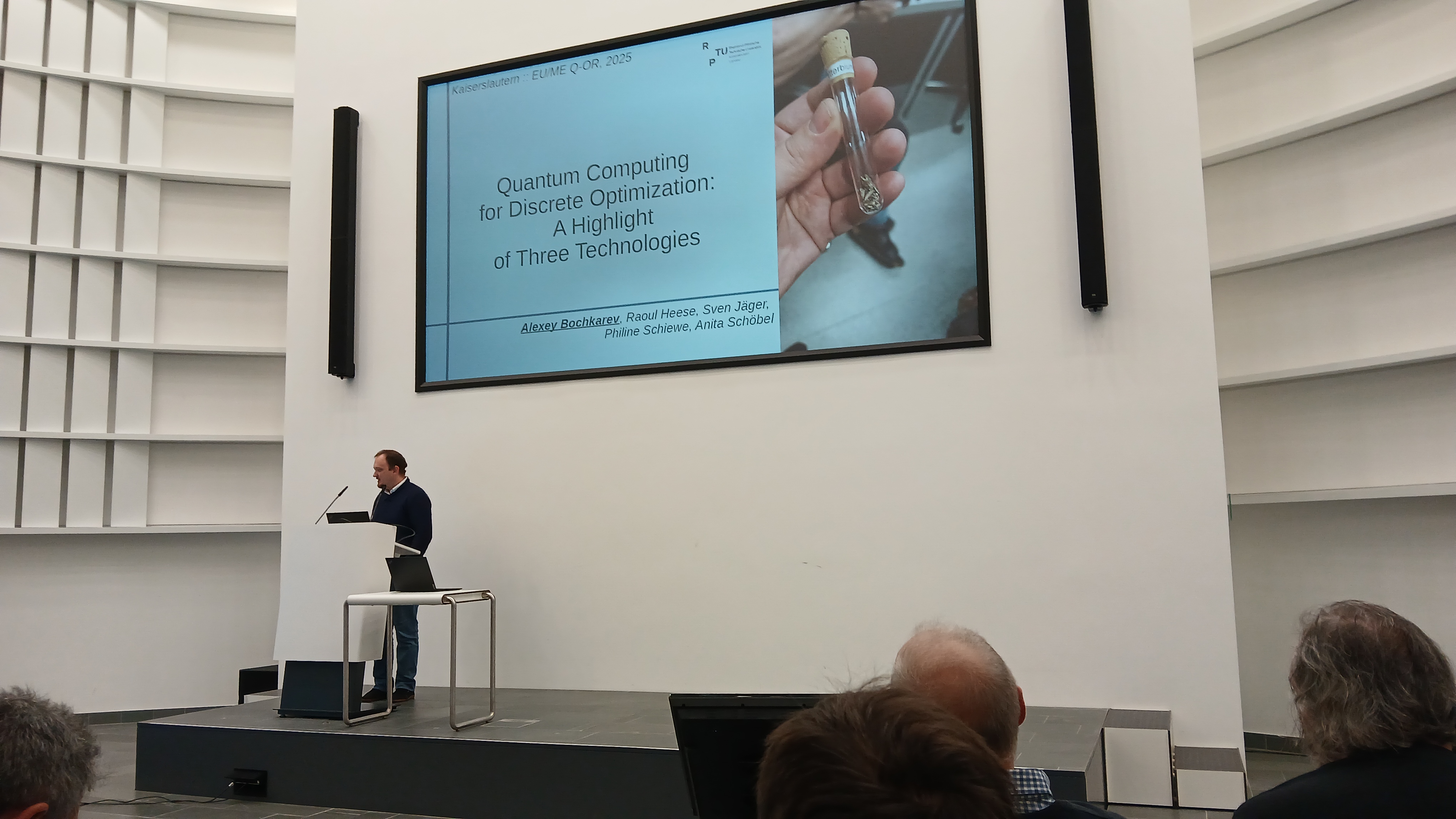
Alexey... EURO Quantum Working Group 2025Nb. de visiteurs : 1876 -
• Wenesday 10 September : Opening event and sessions (QLM, Qiskit)
-
